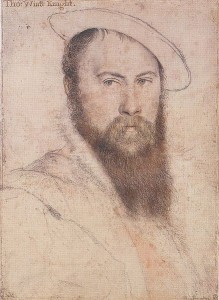 A Facebook post by the BBC has just alerted me to the fact that it is World Poetry Day today. How can I be a literature lover and not know that? Oh dear!
A Facebook post by the BBC has just alerted me to the fact that it is World Poetry Day today. How can I be a literature lover and not know that? Oh dear!
I love so many poems, but because I have a rather soft spot for Thomas Wyatt the Elder I will share one of his poems, one which is linked to Anne Boleyn:
Whoso list to hunt, I know where is an hind,
But as for me, hélas, I may no more.
The vain travail hath wearied me so sore,
I am of them that farthest cometh behind.
Yet may I by no means my wearied mind
Draw from the deer, but as she fleeth afore
Fainting I follow. I leave off therefore,
Sithens in a net I seek to hold the wind.
Who list her hunt, I put him out of doubt,
As well as I may spend his time in vain.
And graven with diamonds in letters plain
There is written, her fair neck round about:
Noli me tangere, for Caesar’s I am,
And wild for to hold, though I seem tame.
This poem always leaves me wondering and also makes me sad. If it is truly about Anne Boleyn, which it does seem to be, then Anne is depicted as a deer hunted down. Wyatt steps out of the hunt and she is caught by another hunter and becomes his. I do love the last line though; she may be Caesar’s and she may seem tame, but she is still “wild for to hold”. If only Wyatt hadn’t been married!
And I can’t talk about Tudor poets and poetry without mentioning George Boleyn, who was also known for his poetry! Here is a video that Clare Cherry and I did on George Boleyn’s poetry:
Is there a Tudor poem that you love? Please do share.